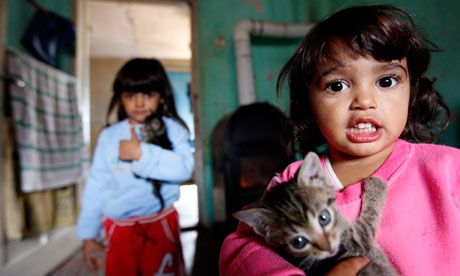Hungary: mothers get extra votes on behalf of their children
Hungarian mothers to get extra votes for their children in elections

Roma children from near Budapest. Concern over the Roma winning more votes is one obstacle in the path of this new legislation. Photograph: Laszlo Balogh/Reuters
In a move that would be unprecedented in a modern democracy, Hungary's new government is considering giving mothers with small children extra votes in elections.
The conservative Fidesz party has made several controversial decisions since coming to power on a populist rightwing agenda, including a crackdown on the media, but the latest proposal could be prove to be its most contentious.
"Some 20% of society are children," said József Szájer, a senior Fidesz official and MEP. "This is quite a considerable group that is left out of representation. The interests of these future generations are not represented in decision-making." He added: "We know at first it seems an unusual idea, but in the 50s it was unusual to give votes to black people; 100 years ago, it was unusual to give votes to women."
The party initially inserted the provision into a new permanent constitution expected to be approved on Monday, but after polling showed the public divided on the idea because of concerns Roma families would get additional votes, party officials opted instead for legislation.
Szájer said he was inspired by the work of the American demographer Paul Demeny, who developed the concept in 1986. Under Demeny Voting, each parent is given half a vote for each child, permitting a split vote in the event that the parents have differing political loyalties.
However, to counter concerns about the Roma winning more votes, Szájer said in the Hungarian case, the move would have "permitted the passage of a law giving mothers the vote on behalf of a maximum of one child".
He added: "I hope in this case to contribute to a law in the medium term.
"The aim is to continue the debate and increase support for the idea not just in Hungary but in Europe."
The discourse on Demeny Voting first emerged in Germany and Japan in the 2000s as a solution to concerns that policy development is biased in favour of the elderly rather than young families. In early March, the Centre for Intergenerational Studies at Hitotsubashi University held a conference on the subject.
But a University of Chicago law professor, Tom Ginsburg, an expert on new democraciesand co-founder of the Comparative Constitutions project, said the concept dated back to before universal suffrage and the belief that certain people, such as landowners, white males or church figures, have more of a stake in the governance of society.
"This is unprecedented in a democratic constitution, and harkens back to 19th-century use of property qualifications to restrict the franchise," said Ginsburg. "Over-weighting votes for those with families undermines the political rights of those who choose not to have families."
While the provision has the backing of the prime minister and the head of Fidesz's parliamentary group, not everyone in the party backs the move. Fidesz MEP György Schöpflin, who does not believe the idea will come up again in the near future, said it is a project being pushed by "Fidesz elites".
"I can understand what is driving this perspective. Every generation has obligations to its successors. I just don't think parents would be able to conceptualise their children's interest distinct from how they already vote."
The new constitution, which Fidesz can push through because of their coalition's two-thirds majority in parliament, also includes articles that protect the life of a foetus "from conception" and preserves "the institution of marriage between man and woman".